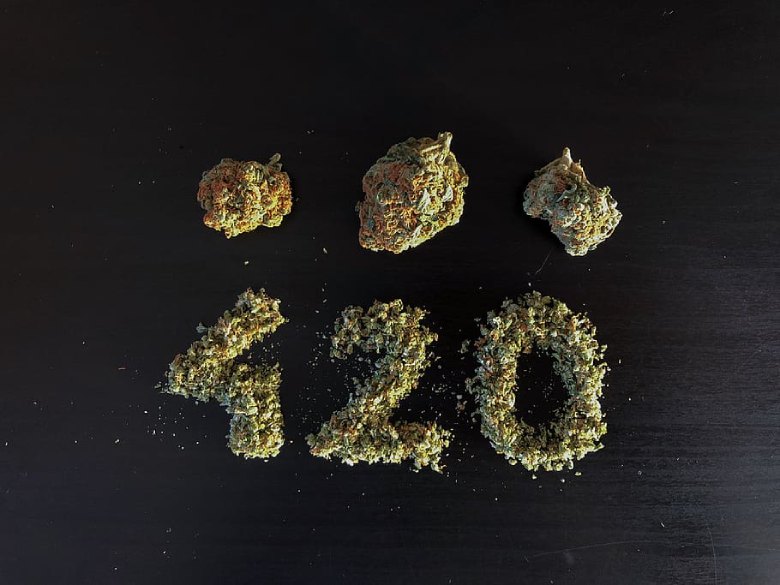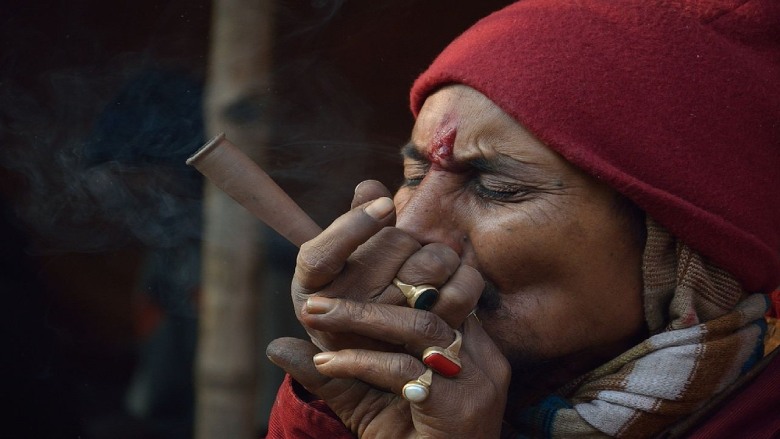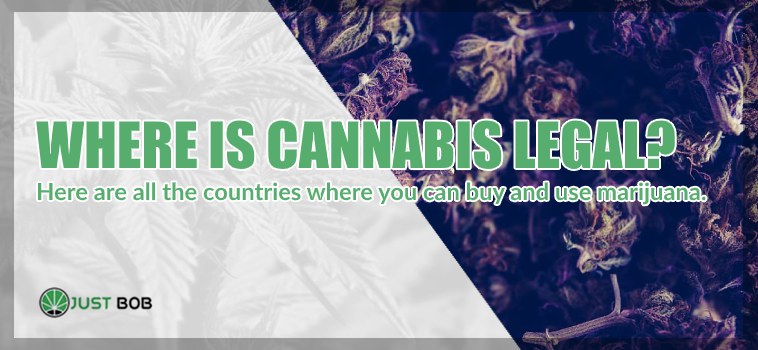Modified on: 15/04/2025
DO YOU WANT TO KNOW WHERE CANNABIS IS LEGAL? HERE ARE ALL THE COUNTRIES WHERE YOU CAN BUY AND USE BOTH RECREATIONAL CANNABIS AND LEGALIZED MEDICAL MARIJUANA
Talking about legal CBD cannabis in the world involves a fundamental distinction between agricultural use, medical use and recreational use.
The first provides for the consumption, production and trade of Cannabis sativa L. in Italy and other countries, a variety of marijuana carefully selected so as not to cause amazing effects even if ingested or inhaled.
This type of hemp, called CBD weed, therefore contains very low amounts of THC and a high percentage of CBD (cannabidiol). It is generally used to reduce the environmental impact in agriculture, produce industrial, artisan and food supplies and much more.

The medical use provides, in Italy, the use of Cannabis FM-2 (with THC between 5 and 8% and CBD between 7.5% and 12%) and Cannabis FM-1 (with THC included between 13 and 20.0% and CBD less than 1%), varieties produced at the Military Pharmaceutical Chemical Plant in Florence.
The third primary use of cannabis, recreational use, relies on high THC content: the effects of consuming high THC marijuana depend on both the type of hemp (Sativa or Indica) and subjective factors. Generally known as “factoring”, recreational cannabis use is still subject to strong prohibition.
In reality, even legal CBD cannabis in Italy, therefore the light type, is often used for recreational purposes.
The reason is simple: the CBD contained in it has relaxing, anti-inflammatory and calming properties. Besides, the taste is the same as cannabis with high THC content.
Therefore, the legal herb is highly appreciated although it does not cause psychotropic effects (thanks to the very low content of tetrahydrocannabinol).
But now let’s talk about marijuana in the world: where is marijuana legal and where, instead, is it prohibited?
Read also: White Widow marijuana: all you need to know about it
Countries Where Cannabis Is Legal: Recreational and Medical Cannabis
The complete marijuana legalization, both for recreational and medicinal purposes, currently affects a few countries:
- Canada made its sale and recreational use legal on October 17, 2018;
- Uruguay: marijuana became legal starting in 2013: any adult, upon registration in a specific consumer register, can freely use it;
- United States: although it is illegal as far as the federal law is concerned, the use and sale of cannabis for recreational purposes is legal in some states such as Oregon, Nevada, California, Alaska, Washington, Colorado and Columbia. Minnesota’s president Tim Walz also signed a bill legalizing recreational marijuana.
- Bangladesh does not have specific marijuana laws, so the consumption, production and sale of marijuana are entirely legal.
There are also some countries where legal weed … is only partially so. Here are which:
- Holland, unlike Europe, known worldwide as the country of coffee shops, was the first to introduce a liberal policy towards cannabis users (January 1, 2001). However, tolerance is limited to coffee shops, outside of which marijuana continues to be considered an illegal drug and holding more than 5 grams is viewed as a crime.
- Spain adopts measures, not unlike the Dutch ones, that legalize cannabis, its use and sale, but only in some specific places.
- Portugal: however, possession is legal, but trading is prohibited.
- Czech Republic: the sale is prohibited, while personal use and cultivation are generally tolerated up to a maximum of 15 grams.
- Germany: personal use is permitted, while buying and selling is still considered illegal.
In most Latin American countries, possession and use are not illegal at all. However, particular aspects and practices are penalized:
- Chile: group use is persecuted.
- Mexico: use and cultivation are illegal unless that no special permits are obtained.
- Brazil: there is a clear distinction between traffickers and consumers, etc.
In other countries, such as India and Jamaica, use is permitted only for religious purposes.

In some other countries, for example, Italy, Paraguay and Australia, recreational marijuana use has been subject to strong decriminalization while remaining illegal. Medical consumption, with a prescription, is instead allowed, and the cultivation of legal hemp is widely practised.
Countries Where Marijuana Use Is Not Legal
Several countries around the world continue to consider marijuana completely illegal and cannabis cannot be found except in the channels of diffusion on the black market.
In these countries, possession of cannabis, even if in minimal quantities, is a crime and is more or less severely punished:
- Japan: all preparations containing THC have been illegal since 1948: strict controls and civil awareness campaigns prevent the formation of an underground cannabis culture;
- Israel: even simple medical use is subject to strict regulations and individual checks by the Ministry of Health;
- New Zealand: both light and recreational cannabis is entirely illegal;
- Croatia: severe fines are also imposed for possession of quantities of less than one gram. Cultivation and sale, on the other hand, are punished with a sentence ranging from 3 to 15 years in prison;
- Romania: drug dealing and possession of modest quantities entail prison;
- Belgium: despite the Dutch border, cannabis remains illegal in all forms;
- Poland: it is completely illegal, and penalties of between 3 and 10 years are expected;
- France: marijuana is considered illicit, and very severe penalties are imposed for possession and consumption despite being one of the European countries where research on cannabis light is at the forefront;
- England: cannabis continues to be considered completely illegal;
The situation in the remaining countries that have not been mentioned is highly paradoxical: in many African countries even though cannabis is considered illegal, the production, consumption and trade of marijuana are unprecedented due to intense political instability.
The same situation characterizes other countries of the Middle and the Far East. However, these countries are also famous for the quality and purity of their cannabis products, such as CBD hash from Pakistan.
Read also: American states where marijuana is legal: here’s where you can smoke cannabis in the USA
CBD Flower in Europe
The landscape of cannabis legalization in Europe, encompassing both medical and recreational aspects, is undergoing significant evolution. While some countries have already legalized medical marijuana, others are considering extending to legalized recreational marijuana as well.
Recently, bills advocating for the legalization of recreational marijuana have been introduced in several European nations, sparking debates and discussions on the subject. Legalizing cannabis could potentially lead to a regulated market, with authorized dispensaries selling cannabis-based products.
However, the issue is multifaceted and involves various factors, including national legislation and European Union regulations. While some European nations have adopted a more lenient approach towards cannabis, others remain staunchly opposed, maintaining strict penalties for its possession and illegal use. Cannabis legalization may also have significant implications for convictions related to its possession and cannabis tourism.
Ultimately, the issue of cannabis in Europe remains a contentious topic, requiring careful balance between medical needs, legal considerations, and public health concerns.
What about CBD in Europe?
The use of CBD flowers in Europe has become a subject of growing interest and debate, particularly within the context of medical marijuana and cannabis legislation.
While CBD, or cannabidiol, is a non-psychoactive compound derived from the cannabis plant, its consumption in flower form raises questions regarding its legality and classification under existing laws. Some European countries wanted to legalize recreational marijuana, but they stopped at CBD flowers for medical purposes, acknowledging their potential therapeutic benefits such as pain relief, anxiety reduction, and anti-inflammatory properties.
However, the regulatory landscape varies significantly across different nations, with some allowing the sale of CBD flowers through licensed dispensaries, while others maintain stricter controls or outright prohibition.
Additionally, the distinction between CBD flowers and THC-containing cannabis flowers remains a point of contention, as THC is the psychoactive compound responsible for the “high” associated with recreational cannabis.
As research into the medical applications of CBD continues and public attitudes evolve, the use of CBD flowers in Europe may see further developments in terms of legalization, regulation, and accessibility.
Conclusions
In conclusion, the landscape of cannabis legalization is rapidly evolving, with an increasing number of countries embracing both recreational and medical marijuana use. While some nations have passed bills legalizing recreational marijuana, others have focused on legalizing medical cannabis to address various health conditions.
The shift towards legalization reflects changing attitudes towards cannabis, recognizing its potential benefits and the need for regulated markets to ensure safety and control. However, disparities in laws and regulations persist, with some regions maintaining strict prohibitions on cannabis possession and use.
As the cannabis industry continues to expand and new research emerges, it’s essential to stay informed about the latest developments in cannabis legalization around the world.
Whether for recreational or medical purposes, understanding the legal landscape of cannabis can help individuals make informed choices and advocate for policies that promote responsible use and access to cannabis products.
If you are curious to try CBD buds, order it now from our e-commerce Justbob!
It will arrive at your house in a short time, but above all, you will consume CBD flowers, of the best quality (organic and certified ) and at very competitive prices.
What are you waiting for? Try it now!





